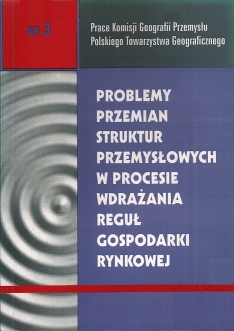Orientacje teoretyczno – metodologiczne w geografii przemysłu a transformacja gospodarki,
DOI:
https://doi.org/10.24917/20801653.3.1Keywords:
metodologia, geografia, przemysłu, transformacjaAbstract
Przedmiotem artykułu jest refleksja nad sytuacją teoretyczno-metodologiczną współczesnej geografii przemysłu oraz nad możliwościami aplikacji niektórych koncepcji do analizy procesu transformacji przemysku w Polsce. Artykuł opiera się na tezach rozprawy habilitacyjnej autora pt. , Adaptacja przestrzenna przemysłu w Polsce w warunkach transformacji''(T. Stryjakiewicz 1999).
Downloads
Metrics
References
Agliella M .. 1979. A theory of capitalist regulation: the US experience. London: New Left Books.
Asheim B.T., Heraldsen T., 1991. Methodological and theoretical problems in economic geography. Norsk Geogr. Tidsskr., 45, 189-200.
Boyer R., 1990. The regulation school: a critical introduction. New York: Columbia University Press.
Chojnicki Z., 1986. Philosophical and methodological orientations of geography. Their conceptions and models. Concepts and Methods in Geography, vol. I, 5-30.
Chojnick.i Z.. 1993. Postmodernistyczne zmiany globalnego porządku społeczno-gospodarczego.
Studia Regionalne i Lokalne (12) 45. Warszawa: Uniwersytet Warszawski, 167-204.
Dicken P., 1994. Global - local tensions: firms and states in global space- economy. Economic Geography, 70, 101-128.
Dicken P., 1998. Global shift. Transforming the world economy (3rd edition). London: Paul
Chapman Publishing.
Dunford M., 1990. Theories of regulation. Environmellt and Planning D, 8, 297-322.
Galbraith J.K., 1967. The new industrial stare. London: Hamish Hamilton.
Gereffi G., 1994. The organisation of buyer - driven global commodity chains: how US retailers shape overseas production networks. In: G. Gereffi, M. Korzeniewicz (eds), Commodity chains and global capitalism. Westport: Praeger/ Greenwood Press, Chapter 5.
Gereffi G., Korzeniewicz M. (eds), 1994. Commodity chains and global capitalism. Westport: Praeger/ Greenwood Press.
Grzeszczak J .. 1991 . Podstawowe orientacje badawcze w geografii przemysłu. W: z. Chojnicki (red.), Podstawowe problemy metodologiczne rozwoju polskiej geografii. Poznań:
UAM, 27-34.
Hayter R.. 1997. The dynamics of industria/location. The factory, the firm and the production system. Chichester: John Wiley.
Jerczyński M., Grzeszczak J ., Muzioł A., Nowosielska E., Rozłucki W., Węcławowicz G., 1991. Główne orientacje badawcze w geografii społecznej i gospodarczej. W: Z. Chojnicki (red.), Podstawowe problemy metodologiczne rozwoju polskiej geografii. Poznań: UAM, 7-26.
Jessop B., 1990. Regulation theory in retrospect and prospect. Economy and Society, 19, 2. 153-216.
Krumme G., 1969a. Towards a geography of enterprise. Economic Geography, 45, 30-40.
Leborgne D., Lipietz A., 1988. New technologies, new modes of regulation: some spatial implications. Environment and Planning D, 6, 263-280.
Leborgne D., Lipietz A., 1992. Conceptual fallacies and open questions on post-Fnrdism. In: M. Storper, AJ. Scott (eds), Pathways to industrialisarion and regional development.
London: Routledge, 332-348.
Lever W.F., 1985. Theory and method in industrial geography. In: M. Pacione (ed.). Progressin industrial geography. London: Croom Hełm. 10-39.
Libura H .. l 990. Miasto jako miejsce. Pojęcie miejsca w geografii humanistycznej. Rozwój Regionalny, Rozwój Lokalny, Samorząd Terytorialny, 31. Warszawa: Uniwersytet Warszawski.
Lipietz A., 1986. New tendencies in the intemational division of labour: regimes of accumulation and modes of regulation. In: AJ. Scott, M. Storper (eds), Production, work, territory. Boston: Allen and Unwin, 16-40.
Lipietz A., 1987. Mirages and miracles: the crisis of global Fordism. London: Verso.
Lipietz A., 1988. Rejlections on a ta/e: the Marxist foundations of the concepts of regulation and accumulation. Studies in Political Economy 26, 7-36.
Lipietz A., 1992. The regulation approach and capiralist crisis: an altemative compromise for the 1990's. In: M. Dunford, G. Kafkalas (eds). Cities andregionsin the new Europe: the globallocal interplay and spatial deve/opment strategies. London: Belhaven Press. 309-334.
Matykowski R., Stryjakiewicz T .. 1992. The adaptation of industry and its labour force to the changing e eonomie system in Poland. Erdkunde. 46. 149-157.
Mladek J .• 1997. Transformarion processof industry in Slovakia. W: Z. Zioło (red.), Problemy transformacji struktur przemysłowych w procesie przechodzenia do gospodarki rynkowej. Warszawa-Kraków, 169-178.
Porter M.E., 1990. The competitive advantage ofnations. London: Macmillan.
Smith A., 1995. Regulation the only, strategies of emetprise imegration and the political economy of regional economic restructuring in Central and Eastern Europe: the case of Slovakia. Regional Studies. 29, 8, 761-772.
Storper M., 1981. Towards a struciurai theory of industriallocation. In: J. Rees, G.J.D. Hewings, H.A. Stafford (eds), Industrial location and regional systems. New York Bergin, 17-40.
Storper M., 1992. The limitsto globalisation: technology districts and international trade.
Economic Geography, 68, 60-93.
Stryjakiewicz T.. 1994, Próba analizy i oceny procesów transformacji przemysłu w Polsce w świetle postfordowskiego modelu elastycznej produkcji i teorii regulacji. w: z. Zioło (red.), Zachowania przestrzenne przemysłu w zmieniających się warunkach gospodarowania. Kraków-Warszawa, 48-66.
Stryjakiewicz T., 1999. Adaptacja przestrzenna przemysłu w Polsce w warunkach transformacji. Poznań : UAM.
Szekely V., 1993. Geograftekli analyza organizaćneho postavenia priemyselnych prevódzok: priklad Vychodneho Slovenska. Geograficky Ćasopis, 45, 2-3, 183-196.
Watts H.D., 1987. Industrial geography. Essex: Longman, New York: John Wiley.
Yeung H., 1994. Critical reviews oj geographical perspectives on business organizations and the organization of production: towards a network approach. Progress in Human Geography, 18, 460-490.
Downloads
Published
How to Cite
Issue
Section
License
Articles are published under the terms of the Creative Commons License (CC BY-ND 4.0; Attribution– NoDerivs).

